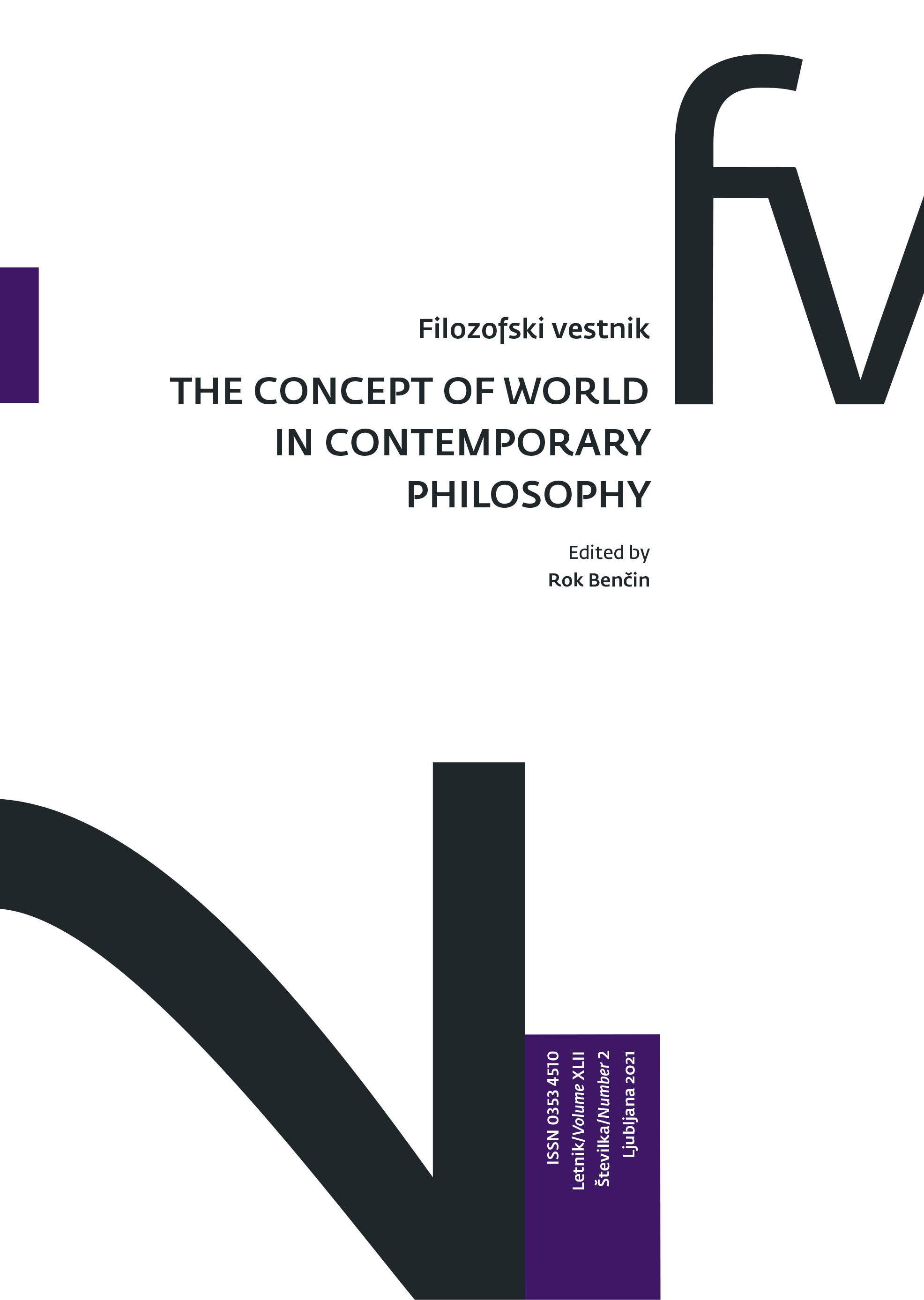Duhovi večnega vračanja: Benjamin in Deleuze bereta Leibniza
DOI:
https://doi.org/10.3986/fv.42.2.14Ključne besede:
apokatastasis, filozofija zgodovine, ponavljanje, modernost, barok, multiverzum, guba, virtualnostPovzetek
Pozne refleksije G. W. Leibniza o večnem vračanju komentatorji pogosto označujejo za nepomembne z vidika širšega konteksta njegove filozofije. To je mogoče pripisati velikemu poudarku, ki ga dajejo na njegove optimistične poglede na človeški napredek, kateremu pojem večnega vračanja na videz nasprotuje. Walter Benjamin in Gilles Deleuze razvijeta vsak svoj koncept večnega vračanja v okviru njune kritike zgodovinskega napredka, kar pa redko povezujejo z njuno recepcijo Leibniza. Članek trdi, prvič, da si po Leibnizu napredek in vračanje ne nasprotujeta, in drugič, da je na Benjaminov in Deleuzov koncept vračanja na različne načine vplivalo njuno branje Leibniza, posebej pa njegovo pojmovanje mnogih svetov, prostorskega ekvivalenta večnega vračanja. S tem bomo osvetlili ne le prispevek Leibnizeve filozofije k razsvetljenskim progresivnim teorijam zgodovine, ampak tudi h kritiki teh vizij.
Prenosi
Literatura
Ansell Pearson, Keith, “Living the Eternal Return as the Event: Nietzsche with Deleuze”, Journal of Nietzsche Studies, 14 (1997), pp. 64–97.
Archimedes, The Works of Archimedes. Edited in Modern Notation with Introductory Chapters, T. Heath (ed.), Cambridge, Cambridge University Press, 2009.
Badiou, Alain, “Gilles Deleuze, The Fold: Leibniz and the Baroque”, in C. V. Boundas and D. Olkowski (eds.), Gilles Deleuze and the Theater of Philosophy, London, Routledge, 2019, pp. 51–69.
Benjamin, Walter, The Arcades Project, trans. H. Eiland and K. McLaughlin, Cambridge, MA, The Belknap Press of Harvard University Press, 1999.
Benjamin, Walter, Selected Writings, Vol. 1, 1913-1926, M. Bullock and M. W. Jennings (eds.), Cambridge, MA, The Belknap Press of Harvard University Press, 2004.
Benjamin, Walter, Selected Writings, Vol. 3, 1935-1938, H. Eiland and M. W. Jennings (eds.), Cambridge, MA, The Belknap Press of Harvard University Press, 2004.
Benjamin, Walter, Selected Writings, Vol. 4, 1938-1940, H. Eiland and M. W. Jennings (eds.), Cambridge, MA, The Belknap Press of Harvard University Press, 2006.
Benjamin, Walter, Origin of the German Trauerspiel, trans. H. Eiland, Cambridge, MA, Harvard University Press, 2019.
Blumenberg, Hans, “On a Lineage of the Idea of Progress”, Social Research, 41 (1/1974), pp. 5–27.
Buck-Morss, Susan, The Dialectics of Seeing: Walter Benjamin and the Arcades Project, Cambridge, MIT Press, 1999.
Codert, Allison, Leibniz and the Kabbalah, Dordrecht, Kluwer Academic, 1995.
Couturat, Louis, La logique de Leibniz d’après des documents inédits, Paris, Ancienne Librairie Germer Baillière, 1901.
Deleuze, Gilles, The Fold: Leibniz and the Baroque, trans. T. Conley, London, The Athlone Press, 1993.
Deleuze, Gilles, Essays Critical and Clinical, trans. D. W. Smith and M. A. Greco, London, Verso, 1998.
Deleuze, Gilles, Difference and Repetition, trans. P. Patton, London, Continuum, 2004.
Deleuze, Gilles, Nietzsche and Philosophy, trans. H. Tomlinson, New York, Columbia University Press, 2006.
Deleuze, Gilles, Cinema 2, trans. H. Tomlinson and R. Galeta, London, Bloomsbury, 2013.
Deleuze, Gilles and Félix Guattari, What Is Philosophy?, trans. H. Tomlinson and G. Burchell, London, Verso, 2011.
Desideri, Fabrizio, “Intermittency: The Differential of Time and the Integral of Space, The Intensive Spatiality of the Monad, the Apokatastasis and the Messianic World in Benjamin’s Latest Thinking”, Aisthesis rivista on-line del Seminario Permanente di Estetica, 9 (1/2016), pp. 177–187.
Fichant, Michel, “Ewige Wiederkehr oder unendlicher Fortschritt: Die Apokatastasisfrage bei Leibniz”, Studia Leibnitiana, 23 (2/1991), pp. 133–150.
Koselleck, Reinhart, Futures Past: On the Semantics of Historical Time, New York, Columbia University Press, 2004.
Leibniz, Gottfried Wilhelm, The Monadology and Other Philosophical Writings, R. Latta (ed.), London, Oxford University Press, 1948.
Leibniz, Gottfried Wilhelm, Philosophical Papers and Letters, L. E. Loemker (ed.), Dordrecht, Kluwer, 1976.
Leibniz, Gottfried Wilhelm, Philosophical Essays, R. Ariew and D. Garber (eds.), Indianapolis, Hackett, 1989.
Leibniz, Gottfried Wilhelm, De l’Horizon de la Doctrine Humaine (1693), La Restitution Universelle (1715), Michel Fichant (ed.), Paris, Vrin, 1991.
Leibniz, Gottfried Wilhelm, New Essays on Human Understanding, Cambridge, Cambridge University Press, 1996.
Leibniz, Gottfried Wilhelm, Theodicy: Essays on the Goodness of God, the Freedom of Man, and the Origin of Evil, Austin Farrer (ed.), Eugene, Wipf and Stock, 2007.
Leibniz, Gottfried Wilhelm, Leibniz’s Monadology: A New Translation and Guide, trans. L. Strickland, Edinburgh, Edinburgh University Press, 2014.
Leibniz, Gottfried Wilhelm, “Apokatastasis Panton”, trans. D. Forman, 2017, https://philarchive.org/archive/LEIAPA-4, accessed 30 September 2021.
Lewis, David K., On the Plurality of Worlds, Oxford, Blackwell, 1986.
Löwy, Michael, Fire Alarm: Reading Walter Benjamin’s ‘On the Concept of History’, London, Verso, 2016.
Malabou, Catherine, “The Eternal Return and the Phantom of Difference”, Parrhesia, 10 (2010), pp. 21–29.
Osborne, Peter, The Politics of Time: Modernity and Avant-Garde, London, Verso, 1995.
Plato, The Timaeus of Plato, R. D. Archer-Hind (ed.), London, Macmillan, 1888.
Russell, Bertrand, A Critical Exposition of the Philosophy of Leibniz. With an Appendix of Leading Passages, Nottingham, Spokesman, 2008.
Rutherford, Donald, Leibniz and the Rational Order of Nature, Cambridge, Cambridge University Press, 1995.
Serres, Michel, Le système de Leibniz et ses modèles mathématiques: Etoiles, schémas, points, Paris, PUF, 1990.
Spitz, Lewis W., “The Significance of Leibniz for Historiography”, Journal of the History of Ideas, 13 (3/1952), pp. 333–348.
Weber, Samuel, Benjamin’s -abilities, Cambridge, MA, Harvard University Press, 2010.
Wilson, Catherine, Leibniz’s Metaphysics: A Historical and Comparative Study, Princeton, Princeton University Press, 1990.
Objavljeno
Verzije
- 2022-04-06 (2)
- 2021-12-31 (1)
Kako citirati
Številka
Rubrike
Licenca
Avtorji jamčijo, da je delo njihova avtorska stvaritev, da v njem niso kršene avtorske pravice tretjih oseb ali kake druge pravice. V primeru zahtevkov tretjih oseb se avtorji zavezujejo, da bodo varovali interese založnika ter da bodo povrnili morebitno škodo.
Podrobneje v rubriki: Prispevki





